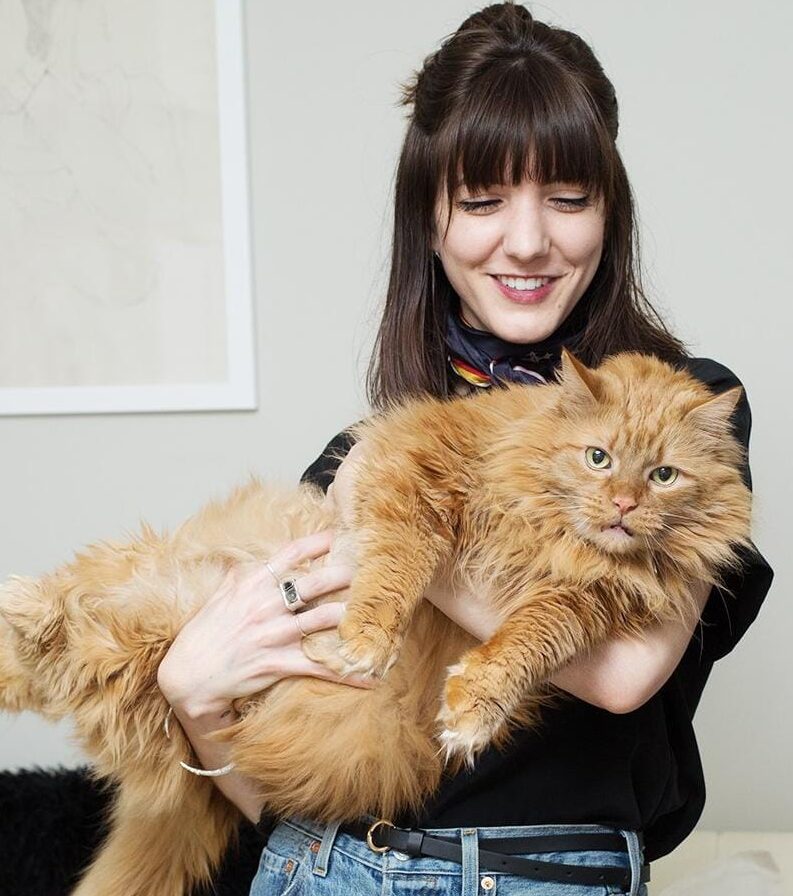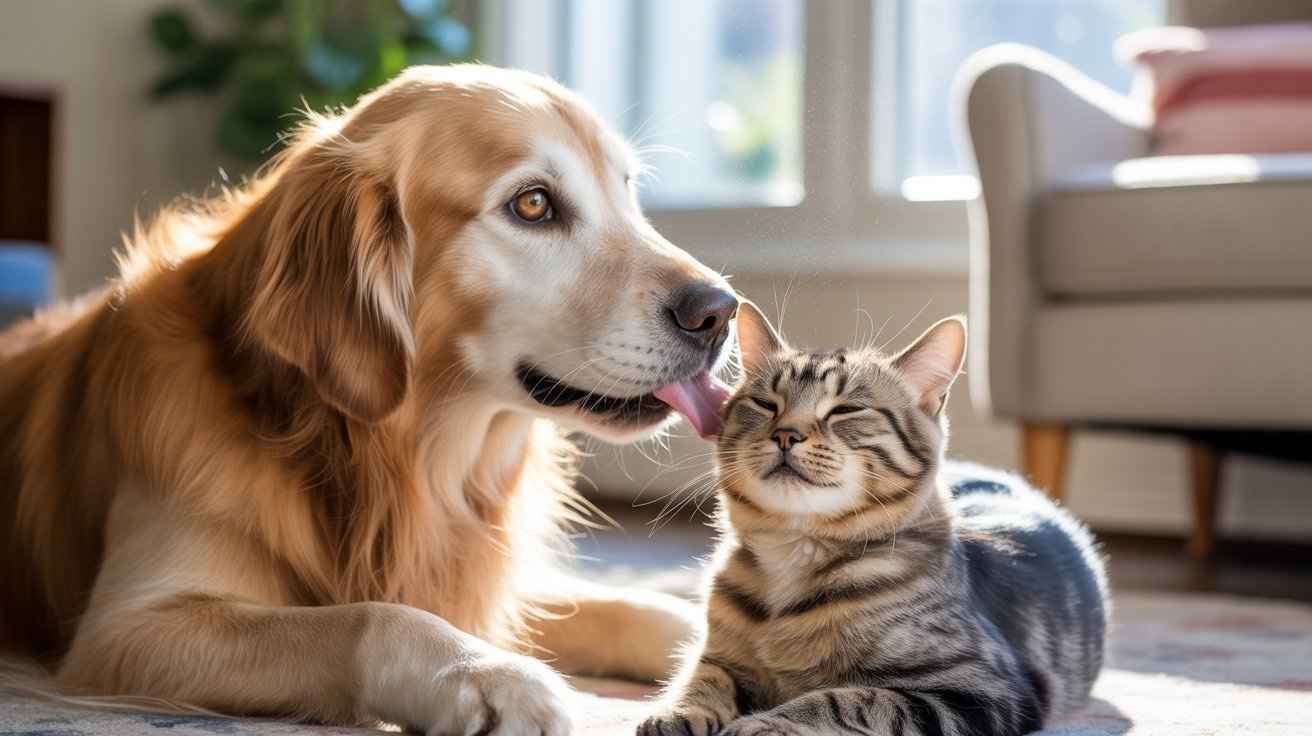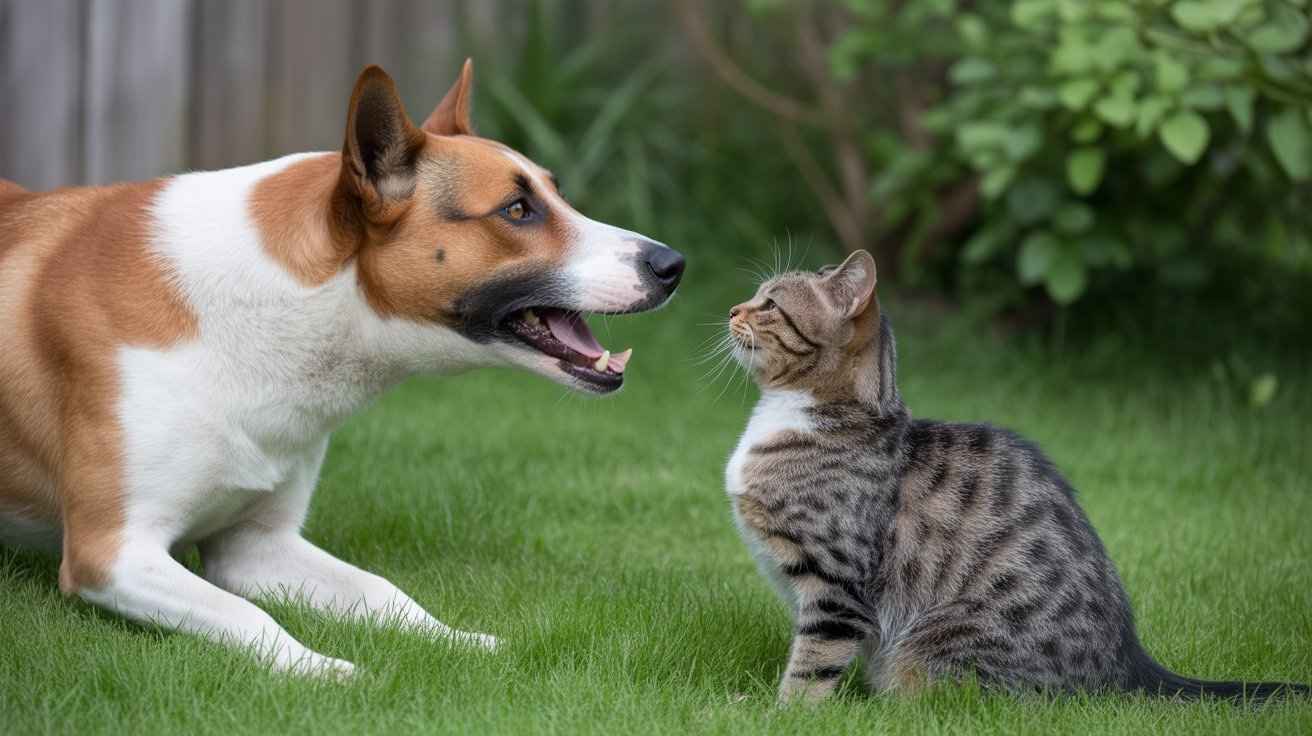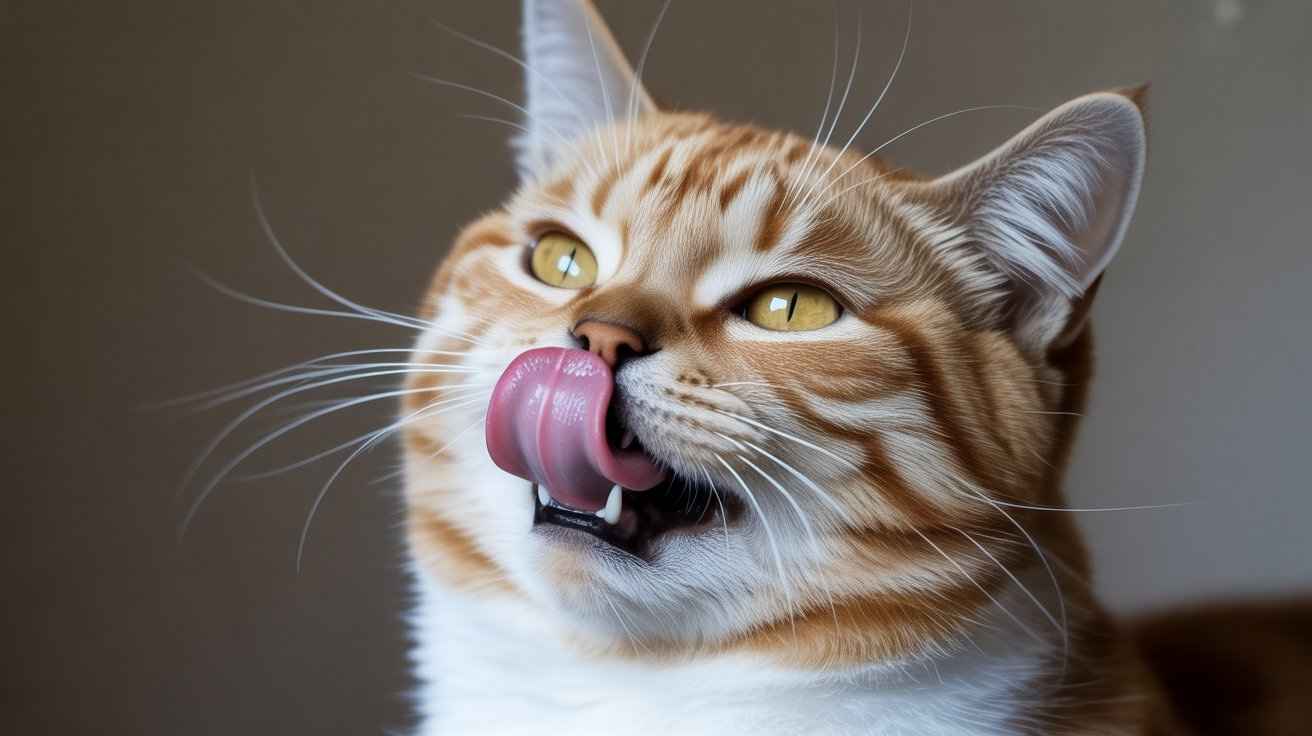Why Does My Dog Lick My Cat’s Privates? There are 4 main reasons: curiosity, grooming, dominance, and stress or anxiety.
Why Does My Dog Lick My Cat’s Privates?
Seeing your dog lick your cat’s privates can be confusing, but it usually has clear reasons. Dogs naturally groom themselves and others, so they may try to clean your cat.
Licking can also be a way to show affection or bond with the cat. Dogs are curious animals, and the cat’s private area has strong scents that give information about health and mood.
Sometimes, licking may signal a health problem, like a urinary tract infection, parasites, or irritation in the cat. Understanding these behaviors helps you protect your cat, prevent health risks, and manage your dog’s actions safely.
Main Reasons Dogs Lick Cats
| Reason | What It Means | Example / Note |
|---|---|---|
| Showing Love and Friendship | A dog smells and licks to understand the cat’s mood, gender, or health | Your dog licks the cat gently to show affection |
| Curiosity | The dog wants to clean or comfort the cat | The dog may sense something unusual about the cat |
| Grooming Instinct | A dog smells and licks to understand the cat’s mood, gender, or health | Licking is similar to how dogs groom other dogs |
| Health-Related Reasons | A dog smells and licks to understand the cat’s mood, gender, or health | Changes in scent from infection or irritation can attract licking |

Main Reasons Dogs Lick Cats
1. Showing Love and Friendship
Dogs lick to show they like someone. When your dog licks your cat’s privates, it often means your dog loves your cat. It is a way to be friends.
2. Being Curious
Dogs use their mouth and noses to explore. The smell of a cat’s private area tells your dog many things. Dogs can learn about your cat’s mood, health, and gender.
3. Cleaning and Grooming
Licking is also a way to clean. Dogs sometimes similarly groom cats in the same way they groom other dogs. It is an instinct to help and care for a friend.
4. Health Reasons
Sometimes, dogs lick because something is wrong with the cat. Your cat may have a minor sickness or irritation. If your cat smells bad or seems sick, see a vet.
Medical Reasons in the Cat
Sometimes, the answer to “Why does my dog lick my cat’s privates?” is a health problem in the cat. Dogs have a strong sense of smell and taste.
If your cat has a urinary tract infection, parasites, or discharge, the dog may notice it before you do. The licking is the dog’s way of checking or trying to clean the area.
It might also happen if the cat has skin irritation or pain near the private parts. While this may look like care, it is not safe. Too much licking can spread germs and worms. If you see this often, it is best to take your cat to the vet.

When Licking Is a Problem
Some licking is normal, but too much licking can be a problem. Signs include the cat hiding, hissing, or acting stressed, or if you see redness, wounds, or discharge.
Excessive licking can also spread parasites or infections. If the dog licks constantly, it may be compulsive behavior. This is not just strange; it can be harmful to the cat and sometimes the dog.
In these cases, stop the licking with supervision, training, or separation, and call a vet to check both pets’ health.
Health Risks & Hygiene Concerns
Licking a cat’s privates can spread parasites, worms, and germs. Dogs may swallow roundworm or tapeworm eggs, which can make them sick.
Germs from urine or discharge can cause infection in either pet. Licking too much may also irritate the cat’s skin. To stay safe, keep both pets on regular deworming, flea control, and vaccinations. Wash your hands after touching pets or cleaning litter boxes.
Maintaining good hygiene between pets reduces health risks and keeps your dog and cat safe. Regularly monitoring your pets helps catch any medical problems early.

How to Stop or Reduce the Behavior
If you want to stop your dog from licking your cat’s privates, start with supervision. Say “No” calmly and redirect your dog to a toy or treat.
Use commands like “leave it” and reward good behavior. Daily exercise and playtime help reduce boredom, which can cause attention-seeking licking. Keep pets separated when unsupervised if needed.
If your dog continues to lick excessively, it could be compulsive behavior or anxiety. In that case, consult a vet or an animal behavior expert. Training and positive reinforcement protect the cat and teach the dog healthy habits.
When to See the Vet

Visit the vet if your dog frequently licks the cat’s genitals, or if you notice blood, discharge, or worms. Also watch for signs of pain, hiding, or loss of appetite in the cat.
If the dog vomits, has diarrhoea, or acts sick after licking, it may have parasites or an infection. The vet can run urinalysis, faecal tests, and physical exams to identify problems.
Early vet care protects both pets and ensures healthy grooming and bonding without health risks.
Dog–Cat Hygiene Quick Tips
- Observe the behavior — occasional licking is regular, constant is not.
- Rule out health issues like infection or irritation with a vet check.
- Redirect your dog with toys or treats when licking starts.
- Keep your cat clean and litter box fresh to reduce attraction.
- Seek veterinary or behaviorist help if licking becomes obsessive.
FAQs
Q1: Is it normal for my dog to lick my cat’s privates?
A1: Yes, it’s generally normal behaviour, often related to bonding or curiosity.
Q2: Should I stop this behaviour?
A2: If it’s occasional and doesn’t cause distress, it’s usually fine. However, if it’s excessive or your cat seems uncomfortable, consider intervening.
Q3: Could this behaviour indicate a health problem?
A3: It can, especially if accompanied by other signs of illness. Monitoring both pets and consulting a veterinarian if needed is recommended.
Q4: How can I prevent my dog from licking my cat’s privates?
A4: Redirecting attention, providing separate spaces, and using positive reinforcement can help manage the behaviour.

Hi, I’m Sana Sajid!I’m the voice behind CatsCare.blog, sharing my 10+ years of hands-on cat care experience. With a diploma in animal care, I offer practical tips, trusted advice, and easy-to-follow guides to help keep your cats healthy and happy.
When I’m not writing, I spend time with my own cats or exploring the latest developments in feline health. Follow CatsCare.blog for expert insights and real cat stories!





![A medium-sized dog with a black, brown, and white coat is leaning over a tabby cat that is lying on its back on a beige carpet. The dog has its mouth slightly open and is looking directly at the camera. The cat is looking slightly to the side with wide eyes. They are both on a carpeted floor indoors, with a blurry background showing furniture. [Why Does My Dog Hump My Cat?]](https://catscare.blog/wp-content/uploads/2025/09/Why-Does-My-Dog-Hump-My-Cat.jpg)
One thought on “Why Does My Dog Lick My Cat’s Privates? 4 Top Reasons”